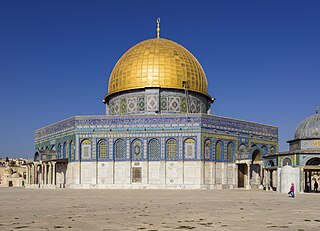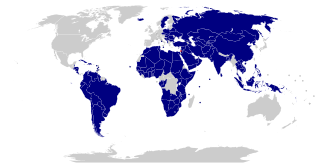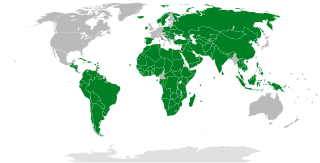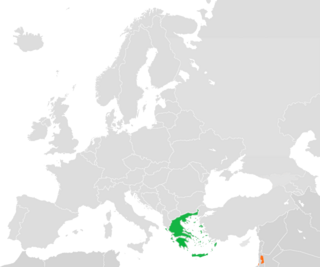
United Nations Security Council Resolution 242 (S/RES/242) was adopted unanimously by the UN Security Council on November 22, 1967, in the aftermath of the Six-Day War. It was adopted under Chapter VI of the UN Charter. The resolution was sponsored by British ambassador Lord Caradon and was one of five drafts under consideration.

The history of the State of Palestine describes the creation and evolution of the State of Palestine in the West Bank and Gaza Strip.

The Palestinian territories are the two regions of the former British Mandate for Palestine that have been occupied by Israel since the Six-Day War of 1967, namely the West Bank and the Gaza Strip. The International Court of Justice (ICJ) has referred to the West Bank, including East Jerusalem, as "the Occupied Palestinian Territory", and this term was used as the legal definition by the ICJ in its advisory opinion of July 2004. The term occupied Palestinian territory was used by the United Nations and other international organizations between October 1999 and December 2012 to refer to areas controlled by the Palestinian National Authority, but from 2012, when Palestine was admitted as one of its non-member observer states, the United Nations started using exclusively the name State of Palestine. The European Union (EU) also uses the term "occupied Palestinian territory". The government of Israel and its supporters use the label "disputed territories" instead.
The Arab League was formed in Cairo on 22 March 1945 with six members: Egypt, Iraq, Transjordan, Lebanon, Saudi Arabia, and Syria. Yemen joined on 5 May 1945. Since its formation the Arab League has promoted the Palestinian Arab cause in the Israeli–Palestinian conflict, including by imposing the Arab League boycott of Israel. The Arab League opposed the United Nations Partition Plan for Palestine in 1947. On 15 May 1948, the then seven Arab League members coordinated an invasion of what was by then the former British Mandate, marking the start of the 1948 Arab–Israeli War.
The Green Line or 1949 Armistice border is the demarcation line set out in the 1949 Armistice Agreements between the armies of Israel and those of its neighbors after the 1948 Arab–Israeli War. It served as the de facto borders of the State of Israel from 1949 until the Six-Day War in 1967, and continues to represent Israel’s internationally recognized borders with the two Palestinian territories: the West Bank and the Gaza Strip.

The status of Jerusalem has been described as "one of the most intractable issues in the Israeli–Palestinian conflict" due to the long-running territorial dispute between Israel and the Palestinians, both of which claim it as their capital city. Part of this issue of sovereignty is tied to concerns over access to holy sites in the Abrahamic religions; the current religious environment in Jerusalem is upheld by the "Status Quo" of the former Ottoman Empire. As the Israeli–Palestinian peace process has primarily navigated the option of a two-state solution, one of the largest points of contention has been East Jerusalem, which was part of the Jordanian-annexed West Bank until the beginning of the Israeli occupation in 1967.

Israel is an associated state of the European Union. The relations between the two are framed in the European Neighbourhood Policy (ENP), the Euro-Mediterranean Partnership, and the Union for the Mediterranean.

China–Palestine relations, also referred to as Sino–Palestinian relations, encompasses the long bilateral relationship between China and Palestine dating back from the early years of the Cold War.

The State of Israel was formally established by the Israeli Declaration of Independence on 14 May 1948, and was admitted to the United Nations (UN) as a full member state on 11 May 1949. As of December 2020, it has received diplomatic recognition from 165 of the 193 total UN member states, and also maintains bilateral ties with all of the Permanent Five. 28 member states have either never recognized Israel or have withdrawn their recognition; others have severed diplomatic relations without explicitly withdrawing their recognition. Additionally, many non-recognizing countries have challenged Israel's existence—predominantly those in the Muslim world—due to significant animosity stemming from the Israeli–Palestinian conflict and the Arab–Israeli conflict.

Relations between the European Union and the Palestine Liberation Organisation (PLO) were established in 1975 as part of the Euro-Arab Dialogue. The EU is a member of the Quartet and is the single largest donor of foreign aid to the Palestinian Authority.

The foreign relations of the State of Palestine have been conducted since the establishment of the Palestine Liberation Organization (PLO) in 1964. Since the Oslo Accords, it seeks to obtain universal recognition for the State of Palestine on the 1967 borders, with East Jerusalem as its capital. As of 4 April 2024, 140 of the 193 United Nations (UN) member states officially recognize the State of Palestine.

The State of Palestine has been accepted as an observer state of the United Nations General Assembly in November 2012. As of 4 April 2024, 140 of the 193 United Nations (UN) member states have recognized the State of Palestine.
There are a wide variety of views regarding the legal status of the State of Palestine, both among the states of the international community and among legal scholars. The existence of a state of Palestine, although controversial, is a reality in the opinions of the states that have established bilateral diplomatic relations. It is a non-member observer state at the United Nations since November 2012. As of 4 April 2024, a total of 140 countries recognize it.

The Embassy of the State of Palestine in Syria is the diplomatic mission of Palestine in Syria. It is located in Murshid Khater St. in Damascus.

The General Delegation of the State of Palestine in the Federal Republic of Germany is the diplomatic mission of the Palestine in Germany in the absence of fully normalized relations. It is located in Berlin. The German Democratic Republic recognized the State of Palestine in 1988 prior to the German reunification in 1990 with West Germany. It was only recently upgraded to a diplomatic mission from a representative office as part of the normalization of relations between the two countries

Saudi Arabia–Palestine relations refers to the bilateral relationship between the Kingdom of Saudi Arabia and the State of Palestine. Their relationship has many facets, and is at best considered complex. The Saudi government struggles to balance the largely pro-Palestinian sympathies among its populace, with its interest in maintaining positive relations with the US in return for protection against hostile actors. There is also an increasing generational divide on the issue of normalization with Israel, with people under 30 more likely to support normalization and reject pan-Arabism than their elders.

Official relations between Poland and the Palestine Liberation Organization (PLO) date back to the 1970s, when a PLO representative office was opened in 1976.

Greece–Palestine relations are bilateral relations between the Hellenic Republic and the State of Palestine. Due to the historical ties between the two countries, Greece and Palestine today enjoy excellent diplomatic relations. Palestine has a representative office in Athens and Greece's consulate general in Jerusalem is accredited to Palestine. The two countries are members of the East Mediterranean Gas Forum.

Palestine–Sudan relations are the political and economic relations between the State of Palestine and Sudan. The State of Palestine has an embassy in Khartoum. But Sudan does not have a representative office or embassy in the State of Palestine. The two countries form part of the Middle East region and share strong and similar cultural ties together. Sudan supports the independence of Palestine. Many Palestinians reside in Sudan to study or to work.

















